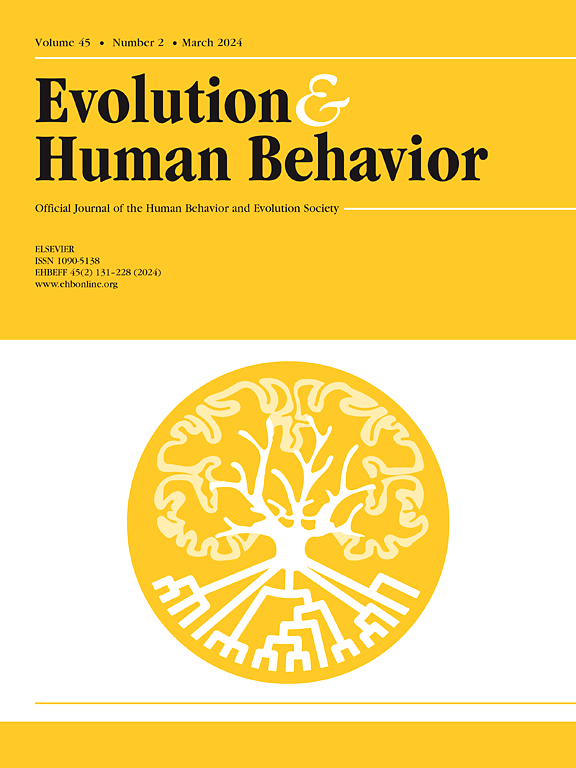Coalitional support regulates resource divisions in men
IF 3.2
1区 心理学
Q1 BEHAVIORAL SCIENCES
引用次数: 0
Abstract
The logic of animal conflict predicts that organisms should assess cues of formidability to mitigate the costs of escalated contests. Accordingly, individual fighting ability has been shown to regulate the outcome of contests: All else equal, more formidable individuals claim a larger share of disputed resources, and less formidable individuals defer to their claims. The human ability to cooperate in groups complicates these interactions because a coalition of individuals can take resources from an individual that none of them could dominate when acting alone. We propose that the prevalence of male coalitional aggression in humans selected for psychological mechanisms that track how much coalitional support is immediately available to men when they are contesting a resource and use this information to regulate decisions about how to divide it. Specifically, men with coalitional allies present should be motivated to press their self-interest more than men who are acting alone—even if the solitary man has allies elsewhere. Experiments using economic games in a university lab setting were employed to test this coalitional support hypothesis. Across six experiments employing three different economic games (total n = 496), coalitional support consistently regulated men's—but not women's—choices. These results suggest that coalitional support is an important factor regulating resource division in men. The fact that women pressed their self-interest, but did so whether allies were present versus absent, suggests that women's coalitional psychology was designed by different selection pressures than men's.
联合支持调节男性的资源分配
动物冲突的逻辑预测,生物应该评估强大的线索,以减轻升级竞争的成本。因此,个人的战斗能力已经被证明可以调节竞争的结果:在其他条件相同的情况下,更强大的个体要求更大份额的争议资源,而不那么强大的个体则服从他们的要求。人类在群体中合作的能力使这些互动变得复杂,因为一个个体的联盟可以从一个个体那里获得资源,而这些资源在单独行动时任何一个个体都无法占据主导地位。我们认为,男性联盟攻击在人类中的普遍存在,是因为当男性在争夺资源时,他们可以立即获得多少联盟支持,并利用这些信息来调节如何分配资源的决定。具体来说,与独自行动的人相比,有联盟盟友在场的人应该更有动力去追求自己的利益——即使这个孤独的人在其他地方有盟友。在大学实验室环境中使用经济博弈的实验来检验这一联盟支持假设。在采用三种不同经济博弈(总n = 496)的六个实验中,联合支持始终调控着男性(而非女性)的选择。这些结果表明,联盟支持是调节男性资源分配的重要因素。事实上,无论同盟是否存在,女性都强调自己的利益,这表明女性的结盟心理是由不同于男性的选择压力设计的。
本文章由计算机程序翻译,如有差异,请以英文原文为准。
求助全文
约1分钟内获得全文
求助全文
来源期刊

Evolution and Human Behavior
生物-行为科学
CiteScore
8.30
自引率
9.80%
发文量
62
审稿时长
82 days
期刊介绍:
Evolution and Human Behavior is an interdisciplinary journal, presenting research reports and theory in which evolutionary perspectives are brought to bear on the study of human behavior. It is primarily a scientific journal, but submissions from scholars in the humanities are also encouraged. Papers reporting on theoretical and empirical work on other species will be welcome if their relevance to the human animal is apparent.
 求助内容:
求助内容: 应助结果提醒方式:
应助结果提醒方式:


